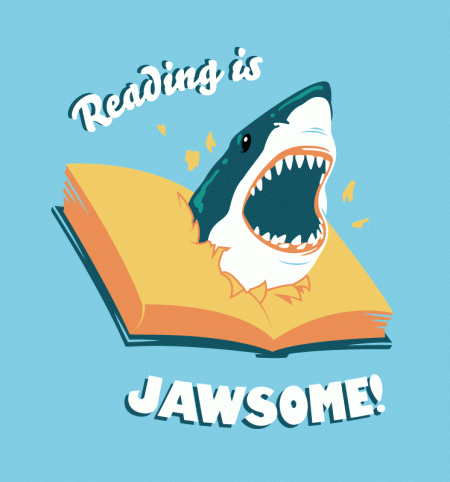
4 Books to Sink Your Teeth Into: A Shark Week Reading List
It’s been a tough several weeks for reading in my household. After sacrificing all my free time at the beginning of the month to the Olympics, I’m now being totally absorbed by Shark Week over at the Discovery Channel. Unlike several close friends and my sister, I’m not especially afraid of sharks, so spending the week in the ocean always piques my curiosity to read more about creatures of the deep. Here are a few of the books I found this week that I’ll be looking to read soon.
Demon Fish by Juliet Eilperin
It makes sense to start a Shark Week reading list with a book about the big guys themselves. Demon Fish is a relatively recent book — out in paperback on July 24 of this year — all about the secret underwater world of sharks and their relationship with humans. Juliet Eilperin, an environmental reporter for The Washington Post, argues that although we think of sharks as terrifying and “relentless predators,” in reality humans are the bigger threat. In fact, as Eilperin told NPR, humans aren’t even a very good shark snack:
“We’re not fatty enough. We don’t have enough on us. So, in fact, often when a great white attacks someone, they do the ‘bite and spit.’ They do the bite hoping that we’re a seal and they spit us out. You know, what you see in the movie, and this total consumption of humans, is not usually what happens,” she says. “It’s not to minimize it [when it does happen], but if it’s any consolation, we now have a 90 percent chance of surviving a shark strike, so that’s a lot better odds than it was at the turn of the last century.”
(Special thanks to fellow Rioter Jenn Northington for this suggestion!)
The Secret Life of Lobsters by Trevor Corson
Whenever anyone asks why I love to read narrative nonfiction, my first reply is that I love to be tricked into a learning and caring about a topic I never thought I could find interesting. When they ask for an example, I nearly always offer The Secret Life of Lobsters. In the book, Trevor Corson explores all facets of life on an island lobstering community, from the sea creatures that are harvested and studied to the fishermen and biologists who have made their livelihood in lobsters. The book is really brilliant, however, in the way Corson parallels the lives of the humans and the lobsters and makes both equally as fun to read about. Plus, once you finish reading it you’ll be well-versed in lobster mating rituals — always a fun tidbit at cocktail parties.
The Devil’s Teeth by Susan Casey
Although Susan Casey’s name might be most familiar because of her more recent book about giant waves (aptly titled The Wave), her first book fits this list even better. In The Devil’s Teeth, Casey follows two biologists, Scot Anderson and Peter Pyle, as they do research on a remote island that is home to the “alphas among alphas” of the shark world, the great white sharks of the Farallon Islands. During an eight-week visit during shark season, Casey learns more about the sharks and the threats posed by this type of dangerous field research.
The Search for the Giant Squid by Richard Ellis
The Search for the Giant Squid by Richard Ellis is a big on the older side (1999), but proved to be an irresistible addition to this list the more I read about it — what is more terrifyingly awesome than a creature more than 60 feet long that weighs almost a ton and could wrap you up on giant tentacles? I saw nothing. Like other great nonfiction I love, Ellis brings together many disciplines — literature, pop culture, and science — to tell a story about one of the world’s only true monsters of the sea.
And as a bonus, if you’re interested in other books about man-eating creatures (in and out of the ocean), check out this Goodreads list, which I found creepy and awesome. There’s even a book about murderous horses, although reviews on that one seem dubious at best.








